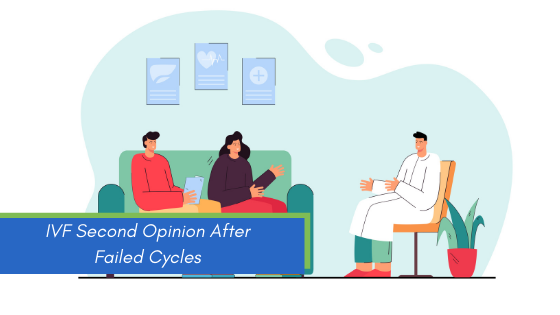We understand the decision to undergo fertility treatment is never an easy one to make and every patient undergoing fertility treatment would like to ensure that they are receiving the best treatment available.
But sometimes, your current clinic might not work out for you; you may feel something lacking, may it be a particular technology or lack of assistance. However, a little voice inside tells you something is off, and that’s when you know it’s time to seek a second opinion for infertility and IVF.
Considering a switch to a new fertility clinic can spur anxiety, confusion, and uncertainty. You might come across a lot of questions like:
- How do I know when it’s time?
- What is the next step?
- What are my alternatives moving forward?
- What other points should I consider?
The following blog aims to answer all the questions:
Understand the reasons why your IVF cycle failed
“It’s important to understand that the chances of a successful IVF after implantation are just about 40 to 50 percent,” says Dr. Malgoankar, Chief Fertility Consultant at Progenesis. He continues, “There is still hope for you, and repeated attempts can help you fulfill your dream of parenthood.”
But what when repeated attempts fail? According to Dr. Malgoankar, “The reasons for this could be poor embryo quality or chromosomal incompetency of the embryos. Other factors that could be responsible are weight gain, unhealthy lifestyle, scarred uterus lining, or anomalies in the endometrium-embryo interaction.”
When to consider an IVF second opinion?
First and foremost, you should seek a second opinion when communication with your current fertility doctor or clinic becomes inconsistent or not up to the standard you expect.
Along with this, the clinical team, experienced professionals, and advanced technologies used by the embryology team, everything needs to be taken into account.
Also, considering an IVF second opinion is important if you have already undergone failed cycles or have general doubts, questions, or concerns regarding your current fertility clinic.
Reasons for considering a second opinion
Usually, a lot of research goes into selecting a fertility clinic, and hence seeking a second opinion is something most patients would rather not consider.
However, there are several reasons where seeking a second opinion might be necessary, some of which are mentioned below:
1. You have tried several cycles of IVF unsuccessfully at your current clinic:
Fertility treatments vary at each clinic as every clinic has its specific protocol and follows different treatment approaches. In this case, make sure you look for the right clinic that offers proper couple evaluation, follows right diagnosis and treatment options and understands the root cause of your condition.
Also, opting for a clinic with advanced treatment options will dramatically alter your chances of success.
2. Want to try a treatment your current clinic doesn’t offer:
Since the past 4 decades, reproductive care is evolving at a fast rate, and not all clinics are equipped with new and advanced treatment methods.
In this case, you need to explore other options with the clinic that offers the latest reproductive technology and is up-to-date with its understanding of advanced fertility treatments.
3. Your rapport has grown stale or is non-existent with your current team:
The success of your treatment depends on your relationship with infertility and the IVF team at the clinic. If you feel uneasy, unimportant, or rushed during your session, you may be hesitant to raise issues and this will affect your treatment.
Sharing a good bond with your fertility team is crucial. Your anxiety may stem from a gut instinct or a sensation.Hence, always trust your intuition and make an appointment with a different clinic to discover the appropriate fit.
Your doctor keeps recommending only certain types of treatment:
Most of the time this is because the fertility clinic does not have advanced fertility treatment options that can work better in your favor. In this case, you must consider opting for a second opinion if the current clinic doesn’t offer a medication or treatment that you are interested in.
Points to remember when considering a second opinion
There are a few things listed below that can help smoothen up your process of finding a qualified second opinion
- Before visiting a new clinic, make sure you have a complete copy of your medical records and test results.
- Bring notes (if any) from your previous clinic visits.
- Make a list of questions and doubts you need to ask.
- If there are any tests or treatments you’d like to try next, don’t be hesitant to ask about them during your appointment.
What to expect from a second opinion?
Usually the clinic will start with reviewing your medical history, and then according to your needs, you will be recommended the required fertility evaluations and diagnosis.
Next, the clinic should provide you with a unique treatment plan that best suits your fertility needs.
At Progenesis, we have a team of expert doctors and embryologists that utilize cutting-edge ART technology to provide you with the best fertility care. We strive to give you a better understanding of your treatment options and ensure that no stone is left unturned. This helps make a real difference in your future success.

